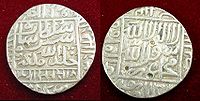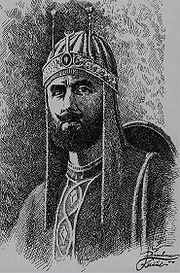
Sur Dynasty
Encyclopedia
The Suri Empire was established by a Muslim
dynasty
of Afghan
origin who ruled a vast territory in the Indian subcontinent
between 1540 to 1557, with Delhi
serving as its capital. It was founded by Sher Shah Suri
, an ethnic Pashtun
(Pathan
) of the house of Sur, who supplanted the Mughal dynasty as rulers of North India during the reign of the relatively ineffectual second Mughal emperor Humayun
. Sher Shah defeated Humayun in the Battle of Chausa (June 26, 1539) and again in the Battle of Bilgram (May 17, 1540).
The Sur dynasty held control of nearly all the Mughal territories, between what is now Khyber Pakhtunkhwa in Pakistan
to the Bengals in the east in what is now Bangladesh
. The Mughals were retreated from India to Persia, while most of what is now Pakistan and northern India
formed the Suri Empire.
During the almost 17 year rule of the Sur dynasty, the region of the Indian subcontinent
witnessed much economic development and administrative reforms. A systematized relationship was created between the people and the ruler, minimizing corruption and oppressing of the public.
Their rule came to an end by a defeat that led to restoration of the Mughal Empire
. Today, the Sur are part of the Pashtun tribal system
and belong to the sub-groups of the Ghilzai
s.

Muslim
A Muslim, also spelled Moslem, is an adherent of Islam, a monotheistic, Abrahamic religion based on the Quran, which Muslims consider the verbatim word of God as revealed to prophet Muhammad. "Muslim" is the Arabic term for "submitter" .Muslims believe that God is one and incomparable...
dynasty
Dynasty
A dynasty is a sequence of rulers considered members of the same family. Historians traditionally consider many sovereign states' history within a framework of successive dynasties, e.g., China, Ancient Egypt and the Persian Empire...
of Afghan
Pashtun people
Pashtuns or Pathans , also known as ethnic Afghans , are an Eastern Iranic ethnic group with populations primarily between the Hindu Kush mountains in Afghanistan and the Indus River in Pakistan...
origin who ruled a vast territory in the Indian subcontinent
Indian subcontinent
The Indian subcontinent, also Indian Subcontinent, Indo-Pak Subcontinent or South Asian Subcontinent is a region of the Asian continent on the Indian tectonic plate from the Hindu Kush or Hindu Koh, Himalayas and including the Kuen Lun and Karakoram ranges, forming a land mass which extends...
between 1540 to 1557, with Delhi
Delhi Sultanate
The Delhi Sultanate is a term used to cover five short-lived, Delhi based kingdoms or sultanates, of Turkic origin in medieval India. The sultanates ruled from Delhi between 1206 and 1526, when the last was replaced by the Mughal dynasty...
serving as its capital. It was founded by Sher Shah Suri
Sher Shah Suri
Sher Shah Suri , birth name Farid Khan, also known as Sher Khan , was the founder of the short-lived Sur Empire in northern India, with its capital at Delhi, before its demise in the hands of the resurgent Mughal Empire...
, an ethnic Pashtun
Pashtun people
Pashtuns or Pathans , also known as ethnic Afghans , are an Eastern Iranic ethnic group with populations primarily between the Hindu Kush mountains in Afghanistan and the Indus River in Pakistan...
(Pathan
Pathan
Pathan may refer to a member of the:*Pashtun people; an ethnic group native to Pakistan and Afghanistan*Pathans of Punjab*Pathans of Rajasthan*Pathans of Uttar Pradesh*Pathans of Bihar*Pathans of Gujarat*Rohilla...
) of the house of Sur, who supplanted the Mughal dynasty as rulers of North India during the reign of the relatively ineffectual second Mughal emperor Humayun
Humayun
Nasir ud-din Muhammad Humayun was the second Mughal Emperor who ruled present day Afghanistan, Pakistan, and parts of northern India from 1530–1540 and again from 1555–1556. Like his father, Babur, he lost his kingdom early, but with Persian aid, he eventually regained an even larger one...
. Sher Shah defeated Humayun in the Battle of Chausa (June 26, 1539) and again in the Battle of Bilgram (May 17, 1540).
The Sur dynasty held control of nearly all the Mughal territories, between what is now Khyber Pakhtunkhwa in Pakistan
Pakistan
Pakistan , officially the Islamic Republic of Pakistan is a sovereign state in South Asia. It has a coastline along the Arabian Sea and the Gulf of Oman in the south and is bordered by Afghanistan and Iran in the west, India in the east and China in the far northeast. In the north, Tajikistan...
to the Bengals in the east in what is now Bangladesh
Bangladesh
Bangladesh , officially the People's Republic of Bangladesh is a sovereign state located in South Asia. It is bordered by India on all sides except for a small border with Burma to the far southeast and by the Bay of Bengal to the south...
. The Mughals were retreated from India to Persia, while most of what is now Pakistan and northern India
India
India , officially the Republic of India , is a country in South Asia. It is the seventh-largest country by geographical area, the second-most populous country with over 1.2 billion people, and the most populous democracy in the world...
formed the Suri Empire.
During the almost 17 year rule of the Sur dynasty, the region of the Indian subcontinent
Indian subcontinent
The Indian subcontinent, also Indian Subcontinent, Indo-Pak Subcontinent or South Asian Subcontinent is a region of the Asian continent on the Indian tectonic plate from the Hindu Kush or Hindu Koh, Himalayas and including the Kuen Lun and Karakoram ranges, forming a land mass which extends...
witnessed much economic development and administrative reforms. A systematized relationship was created between the people and the ruler, minimizing corruption and oppressing of the public.
Their rule came to an end by a defeat that led to restoration of the Mughal Empire
Mughal Empire
The Mughal Empire , or Mogul Empire in traditional English usage, was an imperial power from the Indian Subcontinent. The Mughal emperors were descendants of the Timurids...
. Today, the Sur are part of the Pashtun tribal system
Pashtun tribes
The Pashtun people are the largest ethnic group in Afghanistan and the second largest in Pakistan. Pashtun, tribes are divided into four supertribal confederacies: the Arbanee , Betanee , Gharghasht, and Karlanee .Traditionally, according to folklore, all Pashtuns are said to have descended, at...
and belong to the sub-groups of the Ghilzai
Ghilzai
Ghilzai are the largest Pashtun tribal confederacy found in Afghanistan and Pakistan. They are also known historically as Ghilji, Khilji, Ghalji, Ghilzye, and possibly Gharzai...
s.
List of Sur dynasty rulers

| Name | Picture | Reign started | Reign ended |
|---|---|---|---|
| Sher Shah Suri Sher Shah Suri Sher Shah Suri , birth name Farid Khan, also known as Sher Khan , was the founder of the short-lived Sur Empire in northern India, with its capital at Delhi, before its demise in the hands of the resurgent Mughal Empire... Sultan Sultan is a title with several historical meanings. Originally, it was an Arabic language abstract noun meaning "strength", "authority", "rulership", and "dictatorship", derived from the masdar سلطة , meaning "authority" or "power". Later, it came to be used as the title of certain rulers who... |
 |
May 17, 1540 | May 22, 1545 |
| Islam Shah Suri Islam Shah Suri Islam Shah Suri was the second ruler of the Sur dynasty which ruled part of India in the mid-16th century. His original name was Jalal Khan and he was the second son of Sher Shah Suri. On his father's death, an emergency meeting of nobles chose him to be successor instead of his elder brother Adil... |
May 26, 1545 | November 22, 1553 | |
| Firuz Shah Suri Firuz Shah Suri Firuz Shah Suri was the third ruler of Sur dynasty. He was son of Islam Shah Suri and succeeded him in 1553 when he was twelve years old. Firuz Shah Suri was assassinated within days of his coronation by Sher Shah Suri's nephew Muhammad Mubariz Khan who later ruled as Muhammad Shah Adil.-See... |
1553 | ||
| Muhammad Adil Shah |
1553 | 1555 | |
| Ibrahim Shah Suri Ibrahim Shah Suri Ibrahim Shah Suri was the fifth ruler of Sur dynasty, a Pashtun dynasty of late medieval northern India.-Reign:Ibrahim Khan Suri was son of Ghazi Khan. He was the brother-in-law of sultan Muhammad Adil Shah. He was the grovernor of Agra in 1555, when he revolted against the sultan... |
1555 | ||
| Sikandar Shah Suri Sikandar Shah Suri Sikandar Shah Suri was the sixth ruler of Sur dynasty, a late medieval Pashtun dynasty of northern India. He became the sultan of Delhi after overthrowing Ibrahim Shah Suri.-Early life:... |
1555 | June 22, 1555 | |
| Adil Shah Suri Adil Shah Suri Adil Shah Suri was the seventh and final ruler of the Sur dynasty. He was the brother of Sikandar Shah Suri, who ruled over a region east of Delhi after Sikandar Shah Suri was defeated by Humayun in 1555... |
June 22, 1555 | 1556 |

